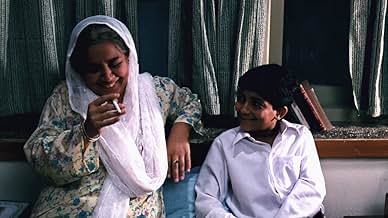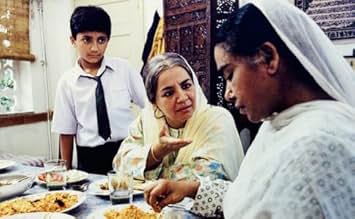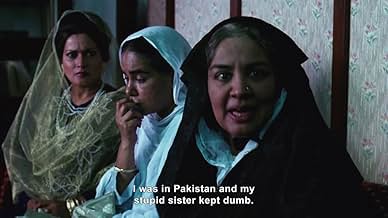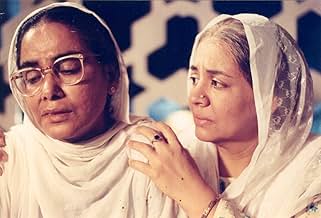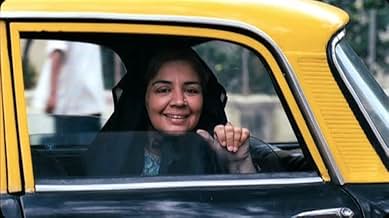Füge eine Handlung in deiner Sprache hinzuMammo moves to Pakistan during the Partition. Years later, with nowhere else to go, she visits Bombay to meet her sister and grandson but struggles to extend her visa.Mammo moves to Pakistan during the Partition. Years later, with nowhere else to go, she visits Bombay to meet her sister and grandson but struggles to extend her visa.Mammo moves to Pakistan during the Partition. Years later, with nowhere else to go, she visits Bombay to meet her sister and grandson but struggles to extend her visa.
- Regie
- Drehbuch
- Hauptbesetzung
- Auszeichnungen
- 4 wins total
Shri Vallabh Vyas
- Sabir
- (as Shrivallabh Vyas)
Empfohlene Bewertungen
Shyam Benegal and Khalid Mohamed create a tender, beautiful account of a Muslim boy's childhood in post-partition India.
On the surface this is the story of a woman like millions others, uprooted by partition - probably the greatest tragedy of our times - trying to get back to her roots. Mammo absolutely refuses to let any politician take away from her what makes her life worth living - her sister, her grandson and her city.
On another, more charming level, it is a lovingly detailed depiction of the world seen through the eyes of the adolescent Riyaz. A sense of shame for one's background, the first time one was moved by poetry (for Riyaz its Kahlil Gibran), a budding fascination with the world of cinema, first experiences with cigarettes and porn, its all there. The atmosphere is made rich by references to Beethoven, Faiz, Gibran and movies like Psycho, Bobby and Garm Hawa.
Farida Jalal and Surekha Sikri turn in great performances. There is a beautiful ghazal sung by Jagjit Sing and written by Gulzar that adds depth and poignancy to the film each time it plays. Gulzar fans will value the use of his jolting story 'Ravi Paar'.
On the surface this is the story of a woman like millions others, uprooted by partition - probably the greatest tragedy of our times - trying to get back to her roots. Mammo absolutely refuses to let any politician take away from her what makes her life worth living - her sister, her grandson and her city.
On another, more charming level, it is a lovingly detailed depiction of the world seen through the eyes of the adolescent Riyaz. A sense of shame for one's background, the first time one was moved by poetry (for Riyaz its Kahlil Gibran), a budding fascination with the world of cinema, first experiences with cigarettes and porn, its all there. The atmosphere is made rich by references to Beethoven, Faiz, Gibran and movies like Psycho, Bobby and Garm Hawa.
Farida Jalal and Surekha Sikri turn in great performances. There is a beautiful ghazal sung by Jagjit Sing and written by Gulzar that adds depth and poignancy to the film each time it plays. Gulzar fans will value the use of his jolting story 'Ravi Paar'.
Mammo might just be India's best family film. And if you want to take it a step further, Mammo might also be one of the best family movies for Muslims all across the world.
Mammo has some more serious undertones -- those of India and Pakistan's unfriendly relations and their impact on regular people, the often ignored violence against women across the Indian sub-continent, the Anglophiles and the class-conscious young children schools have produced, and above all, the lack of sincerity in our daily lives. Mammo represents everything that society has had to lose in its desperation for wealth and luxury, the spirited woman that does whatever her heart wishes (and God permits).
It's funny in some places, very tear-jerking in others. Definitely the best out of Benegal's Muslim trilogy.
Mammo has some more serious undertones -- those of India and Pakistan's unfriendly relations and their impact on regular people, the often ignored violence against women across the Indian sub-continent, the Anglophiles and the class-conscious young children schools have produced, and above all, the lack of sincerity in our daily lives. Mammo represents everything that society has had to lose in its desperation for wealth and luxury, the spirited woman that does whatever her heart wishes (and God permits).
It's funny in some places, very tear-jerking in others. Definitely the best out of Benegal's Muslim trilogy.
Though I saw Mammo quite a long time back, many scenes of this brilliant movie are still fresh in my memory. Farida Jala puffing the cigarette, her scenes with the police, her interactions with the old nani...it feels sad that she has not been utilized int his manner before. Shyam benegal extracts her best. Though Farida has been doing many 'character roles' for a long time now, only 'Dekh Bhai Dekh', a television series, comes to my mind in her recent avatar and movies like Dilwale Dulhania Le Jayenge, raja Hindustani and Kuch Kuch Hota Hai. Not having seen much of her earlier acting ( she's been acting for ages, I guess ), she will remain for me 'Mammo', the aunt.
Though I saw Mammo quite a long time back, many scenes of this brilliant movie are still fresh in my memory. Farida Jala puffing the cigarette, her scenes with the police, her interactions with the old nani...it feels sad that she has not been utilized int his manner before. Shyam benegal extracts her best. Though Farida has been doing many 'character roles' for a long time now, only 'Dekh Bhai Dekh', a television series, comes to my mind in her recent avatar and movies like Dilwale Dulhania Le Jayenge, raja Hindustani and Kuch Kuch Hota Hai. Not having seen much of her earlier acting ( she's been acting for ages, I guess ), she will remain for me 'Mammo', the aunt. (2 February 2006)
Shyam Benegal's Mammo is an account of a certain period in the life of Riyaz, a teenager who lives a poor lifestyle with his grandmother Fayyazi as they get a visit from his grandma's sister Mehmooda Begum Anwar Ali, commonly known as 'Mammo'. Mammo was born in Panipat during the British Raj, but she was one of those many Muslims who left for Pakistan after partition, automatically becoming Pakistani citizens. After the death of her beloved husband, Mammo is thrown out of the house by her relatives, and having nowhere else to go, comes to live with her widowed sister in Bombay on a temporary visa. Lots of things change while she is there, Mammo is loud, vivacious, opinionated and funny, and she keeps everyone on their toes. Initially unhappy with her presence, Riyaz learns to love the old lady and ultimately gets very close to her.
Mammo is a brilliant film, superbly written, directed and acted. It is both entertaining and touching. Shyam Benegal is as already known a true master of his craft. He keeps everything so real and authentic. The film's dialogues and script are exceptional. The relationships are portrayed wonderfully, and Benegal must be applauded for his simple and natural presentation of the three characters and their everyday struggles, through which we get to know of their stories and life experiences. Benegal skillfully captures the atmosphere of those times; the music, the streets, the films, everything is so realistically depicted. At times it felt like a real documentation of a period of time in the lives of these three people. The movie has drama, comedy, and many moments of joy, happiness and rage we all are familiar with.
The story unfolds as seen through the eyes of the young Riyaz. Benegal shows us in minute detail who Mammo was, and clarifies why Mammo occupied such a special place in Riyaz's heart. She was not only a mother figure to him, she could be a friend, a confidant, a spiritual teacher, and generally just a person who could be counted on anytime. Everyone would want to have an aunt like Mammo, an open-minded, honest and straightforward person, who is both funny and likable. I cannot forget the scenes in which she caught Riyaz smoking and promised him to keep it between them or the scene in which she herself asks him to light a cigarette for her and starts smoking. Another memorable scene is the one where Fayyazi gets mad as she finds out porn magazines in Riyaz's closet while Mammo reacts naturally to this, with complete understanding that the boy is now grown. This is such an amazing character.
I can really see why Khalid Mohammed wanted to immortalise Mammo by making her the central character of a feature film. It is partly a comic, partly a dramatic character, and it is just a very inspiring one. She was not only a caring and unselfish person who was always willing to help, she was evidently a strong woman who knew how to take things as they come, live with what God had given her and thank him, and she also had the ability to call a spade a spade and frankly tell her opinion about a person directly in his face. This can be seen in several scenes such as the one in which she attacks her sister Anwari for stealing her and Fayyazi's property. One more scene is the one in which she preaches housemaid Shantabai's husband for drinking and abusing his wife.
But the main reason Mammo will always be remembered is Farida Jalal. This is not only one of her finest performances, this is according to me one of the greatest performances by an actress in a leading role in Hindi cinema. Jalal's portrayal of Mammo is marvelous from start to finish. She is amazingly natural and plays her role with soul, depth and humour, making Mammo so easy to relate to and so easy to like. One can really see the pain in her eyes as she reminisces past incidents, and yet her way to accept what she has and move on is admirable. I cannot see anyone but Jalal in this role. This is an unforgettable performance. Surekha Sikri as the worried and caring Fayyazi is nothing short of excellent, and she too manages to move you in many of her scenes. Amit Phalke plays the young Riyaz exceedingly well, and so does Rajit Kapoor playing the older version of this role.
Mammo is not only an impressive piece of art, it is also a fantastic entertainer which would be certainly enjoyed by the entire family. One has to note Jagjit Singh's wonderful Ghazal which can be heard from time to time. In a few words, Mammo is another masterwork by the great Shyam Benegal - a haunting, moving, involving and riveting tale of one little family. This is a true cinematic experience, one gem of a movie.
Mammo is a brilliant film, superbly written, directed and acted. It is both entertaining and touching. Shyam Benegal is as already known a true master of his craft. He keeps everything so real and authentic. The film's dialogues and script are exceptional. The relationships are portrayed wonderfully, and Benegal must be applauded for his simple and natural presentation of the three characters and their everyday struggles, through which we get to know of their stories and life experiences. Benegal skillfully captures the atmosphere of those times; the music, the streets, the films, everything is so realistically depicted. At times it felt like a real documentation of a period of time in the lives of these three people. The movie has drama, comedy, and many moments of joy, happiness and rage we all are familiar with.
The story unfolds as seen through the eyes of the young Riyaz. Benegal shows us in minute detail who Mammo was, and clarifies why Mammo occupied such a special place in Riyaz's heart. She was not only a mother figure to him, she could be a friend, a confidant, a spiritual teacher, and generally just a person who could be counted on anytime. Everyone would want to have an aunt like Mammo, an open-minded, honest and straightforward person, who is both funny and likable. I cannot forget the scenes in which she caught Riyaz smoking and promised him to keep it between them or the scene in which she herself asks him to light a cigarette for her and starts smoking. Another memorable scene is the one where Fayyazi gets mad as she finds out porn magazines in Riyaz's closet while Mammo reacts naturally to this, with complete understanding that the boy is now grown. This is such an amazing character.
I can really see why Khalid Mohammed wanted to immortalise Mammo by making her the central character of a feature film. It is partly a comic, partly a dramatic character, and it is just a very inspiring one. She was not only a caring and unselfish person who was always willing to help, she was evidently a strong woman who knew how to take things as they come, live with what God had given her and thank him, and she also had the ability to call a spade a spade and frankly tell her opinion about a person directly in his face. This can be seen in several scenes such as the one in which she attacks her sister Anwari for stealing her and Fayyazi's property. One more scene is the one in which she preaches housemaid Shantabai's husband for drinking and abusing his wife.
But the main reason Mammo will always be remembered is Farida Jalal. This is not only one of her finest performances, this is according to me one of the greatest performances by an actress in a leading role in Hindi cinema. Jalal's portrayal of Mammo is marvelous from start to finish. She is amazingly natural and plays her role with soul, depth and humour, making Mammo so easy to relate to and so easy to like. One can really see the pain in her eyes as she reminisces past incidents, and yet her way to accept what she has and move on is admirable. I cannot see anyone but Jalal in this role. This is an unforgettable performance. Surekha Sikri as the worried and caring Fayyazi is nothing short of excellent, and she too manages to move you in many of her scenes. Amit Phalke plays the young Riyaz exceedingly well, and so does Rajit Kapoor playing the older version of this role.
Mammo is not only an impressive piece of art, it is also a fantastic entertainer which would be certainly enjoyed by the entire family. One has to note Jagjit Singh's wonderful Ghazal which can be heard from time to time. In a few words, Mammo is another masterwork by the great Shyam Benegal - a haunting, moving, involving and riveting tale of one little family. This is a true cinematic experience, one gem of a movie.
Wusstest du schon
- WissenswertesMammo is a part of film trilogy centered around the lives of three women Mammo (1994), Sardari Begum (1996) and Zubeidaa (2001). Khalid Mohamed wrote the screenplay of these films with family reminiscences.
- VerbindungenFeatures Garm Hava (1974)
Top-Auswahl
Melde dich zum Bewerten an und greife auf die Watchlist für personalisierte Empfehlungen zu.
- How long is Mammo?Powered by Alexa
Details
- Laufzeit
- 2 Std. 10 Min.(130 min)
- Farbe
Zu dieser Seite beitragen
Bearbeitung vorschlagen oder fehlenden Inhalt hinzufügen

